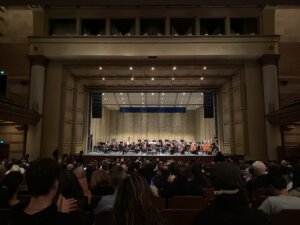Listen to a passionate performance of Yiddish art song
David Childs learned the music of composer Lazar Weiner from his son Yehudi

Graphic by Angelie Zaslavsky
An art song, a piece written to be sung with piano accompaniment and often set to a poem, showcases the emotion and melody of a national or folk tradition in an intimate and refined setting. The German lieder of Franz Schubert and Robert Schumann, the French mélodies of Claude Debussy and Gabriel Fauré, are merely the tip of the iceberg of the canon of Western art song.
What might come as a surprise to even the enthusiast of classical music is that there is also a tradition of Yiddish art song, which began in the early 20th century in St. Petersburg, Russia, by the Society for Jewish Folk Music. They intended to create a “national” Jewish music.
Composer Lazar Weiner is considered the greatest composer of this genre. He was born in Cherkasy, Ukraine, and immigrated to New York as a teenager, where he wrote works of Yiddish choral music and Hebrew liturgical music.
Weiner first encountered Yiddish folk songs and modern poetry after immersing himself in American Yiddish literary circles. One of his works, “A Nign” (A Melody) is adapted from the poetry of Leibush Lehrer, a prominent Yiddish writer of the early 20th century and founder of the Yiddish summer camp Camp Boiberik. In this song translated below by Eliyahu Mishulovin for the Milken Archive, the simplicity and innocence of the Jew is on full display.
A Nign
There was once a pauper,
Who would only quarrel with God.
Wonder upon wonder befell him,
Whenever he sang this sort of nign [melody]:
Tshiri-bim bam bam …
Wine flowed from the nign,
And he swallowed sip after sip.
Wonder upon wonder befell him,
Whenever he sang this sort of nign:
Tshiri-bim bam bam …
The Jew sings, and blissfulness flows
Until he almost leaps for joy.
Wonder upon wonder befell him,
Whenever he sang this sort of nign:
Tshiri-bim bam bam …
Baritone cantorial soloist David Childs performed this piece at UCLA on April 10, 2022 with UCLA Philharmonia conductor Neal Stulberg at the piano. In it, you can hear the lyrical folksiness and operatic skill typical of art song, as well as his passionate interpretation of the music. The performance was part of the inaugural concert for the Lowell Milken Center for Music of American Jewish Experience, a new part of UCLA’s music school that is dedicated to the study and performance of American Jewish music.
Childs told the Forward that he was grateful that Stulberg was his accompanist. “The melody is simple, but the piano part is not, which is characteristic of Lazar Weiner’s music; I’m glad that I had him play it, because he is someone who understands it.”
For Childs, a son of cantor Mark Childs and a cantorial student himself at Jewish Theological Seminary in New York, Yiddish art song was the primary form of classical music he connected to as an undergraduate opera student at UCLA — after discovering it in a 2013 masterclass taught by Lazar Weiner’s son, Yehudi Wyner.
The first Weiner song he learned in that class was “Gramen geshribn in zamd” (Rhymes Traced in Sand). “It was a dark piece lyrically and musically. It honestly felt like the only music that I was singing that my heart connected to. I was starting to study opera and German art song, Italian song, French song, but I did this one Yiddish song and I thought I have to do more of this. I took every opportunity I could to sing as much Jewish art music as I could.”

“A Nign,” which Childs sang almost 10 years after he began learning Weiner’s music, had equal appeal to him. “The song has charisma and is charming and simple,” he said. Childs intends to perform even more Yiddish art songs in the future.
When Childs began Wyner’s class, he worked with UCLA Yiddish lecturer Miri Koral on the correct pronunciation of the lyrics, and also took her Yiddish class. What he learned then has carried over to today.
At a recent performance at UCLA of Lera Auerbach’s “Symphony No. 6 ‘Vessels of Light,’” where he served as a “whisperer,” dramatically intoning lines of Yiddish poetry, he delivered excellent pronunciation according to Koral.
This fact didn’t surprise Koral, who said that opera singers can pick up Yiddish pronunciation quickly. “I’ve coached a number of opera singers, they usually know German, and they, like actors, are very quick to pick up nuances and dialects and everything, and it’s very easy to coach them to do Yiddish properly.”

















